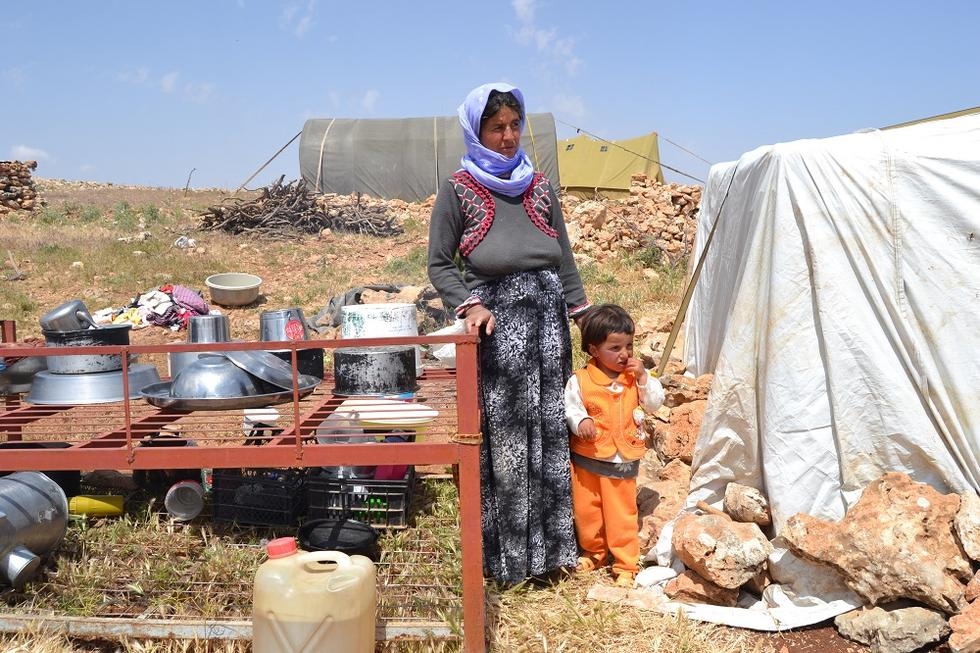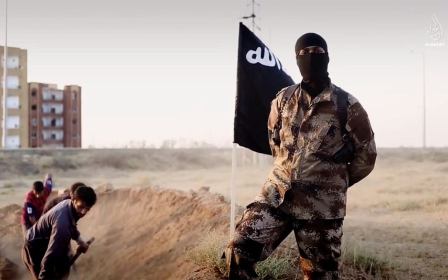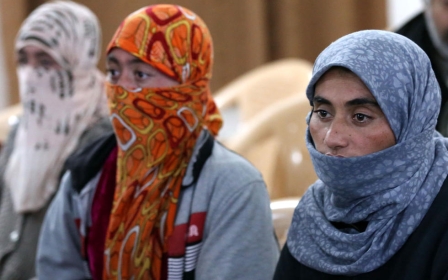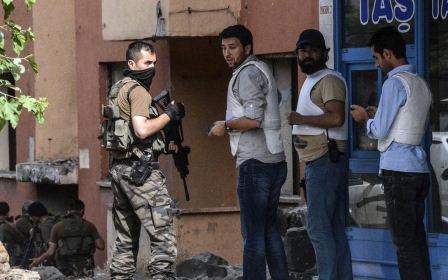Displaced Yazidis still on Mount Sinjar grapple with harsh conditions

MOUNT SINJAR, Iraq - Merkez Badr is rinsing some dishes with a piece of cloth outside a make-shift tent that provides shelter to her family on top of Mount Sinjar.
A couple of hundred metres south, she can get a glimpse of her hometown, Sinjar, which is still partly under the control of Islamic State (IS) militants a year after they first launched a sweeping offensive that saw large swaths of Iraq fall to the militants in just a matter of days.
A mother of nine children, Badr looks far older than her true age, 33.
Her last child was born just a couple of months ago and the toll was difficult to bear. She had to be rushed across a worn-out bumpy road to Dohuk - the closest city - with a proper maternity hospital which is a 3-hour drive away.
Local authorities say Badr's family is one of the over 2,600 families still living on Mount Sinjar and struggling with daily hardship.
It was the harsh conditions here that sparked mass public outrage in the west and helped pave the way for a US-led military offensive against IS in the region last summer.
Within a few weeks - with assistance largely from the Kurdistan Workers' Party (PKK) and its affiliates - the vast majority of the estimated 50,000 people who had fled to the mountains in a desperate search for refuge had left for camps in Kurdish-controlled areas of northern Iraq and Syria, but many stayed.
But some wanted to stay to fight and help liberate their homes, while others were too ill or old to travel or simply hoped the conflict would die down soon.
Almost a year later, however, those who stayed say they feel the world has forgotten about them and that their hardships are far from over.
With occasional fighting raging nearby and the unforgiving cold of winter and heat of summer, life has been very difficult here, Badr said.
"The children are still afraid when they hear the sound of fighting and shells. They sometimes cry when they hear the sound of an explosion," she told Middle East Eye.
As if to corroborate her mother's statement, her 11-year old daughter Nadima burst into tears.
"It's very bad here... we fled our home and they [IS] took everything... It's bad here," she said as tears ran down her sun-burned cheeks.
IS advance
Things might be bad, but those who fled still consider themselves the lucky ones.
When IS ran over Yazidi areas last August, the group killed hundreds if not thousands of teenage boys and men and took away thousands of young women and girls, many of whom have been forced into sexual slavery.
Surrounded by the self-proclaimed IS militants on all sides, the Yazidis were in dire need of humanitarian aid.
In the first days after the IS attack, US and Iraqi planes - as well as fighters affiliated with the Kurdistan Workers' Party (PKK) - delivered some aid but severe shortage of basic goods, as well as the delay in delivering the supplies, caused dozens to die of hunger and thirst.
The Yazidi internally displaced people (IDPs) on Mount Sinjar who MEE spoke to said that they were still short of basic supplies such as food, water and clothes. Some even need new tents as their current ones are worn out.
Despite the relative vicinity of the town of Sinjar where currently a ragtag group of Iraqi Kurdish Peshmerga forces and their Yazidi allies - as well as Kurdistan Workers' Party (PKK) and its Syrian and Yazidi affiliates - are fighting IS. Life still goes on atop of the mountain.
Teenagers can still be seen joyfully kicking around a football as children chase each other yelling and laughing and small-sized dark goats graze on what little grass has not yet been burned by the summer sun.
Ali Khudeda, 38, is one of those who stayed to fight the growing IS threat. When MEE visited the mountain, he had returned home a couple of days earlier from his mission just a few miles down the mountain.
The tent that houses his family has a solar panel, donated by an aid organisation. It supplies power to the light bulbs inside for a few hours every night.
It's emotionally highly demanding to be fighting and also worrying about the conditions of his family on top of the mountain, he explained.
"We came here after the catastrophe that happened," said Khudeda referring to IS's onslaught against his Yazidi community. "We decided to stay here because we didn't want to abandon our land and be confined to camps elsewhere."
He can't conceal his frustration with the circumstances that he and his family have to deal with since.
"There are often clashes - sometimes [they are] small, sometimes [they are] bigger," said Khudeda who is part of a Yazidi force, known as the Qassim Dirbo, which is now supported by Iraqi Kurdistan's Peshmerga ministry.
"And when I occasionally come back here to stay with the family, it's just quite difficult as well. There is almost no assistance from the government and organisations right now."
A major issue is health services. Given the isolated nature of the mountaintop and the fact that most towns and villages around here are still largely deserted, seeking assistance for a serious medical condition is highly challenging. Most of those on the mountain do not have cars to drive the long distances in search of treatment.
"Many of us here suffer from poor health conditions," said Bashar Mirza, 35, and father of five. "There is no specialist doctors around for people with serious illnesses."
Local authorities say they have now reopened the hospital in the nearby town of Sinune which is around half an hour drive from the mountaintop. But the hospital is still grappling with a lack of doctors and medicines.
Maysar Haji Salih, who served as Sinjar's mayor before IS's attack last year and still maintains the post mostly working from Sinune and other Kurdish-controlled areas, says the families residing on the mountaintop need urgent assistance.
"I call upon the governments and international and local aid organisations who can help to provide assistance for the people so they can survive," said Haji Salih.
Time seems to be running out. Many Yazidis did not manage to bring their belongings with them when they fled and very few managed to take what savings and valuables they had. All of those things, like jewelry, have long been confiscated by IS, leaving the vast majority of those still on Mount Sinjar living in highly impoverished conditions with few options.
"The big problem is we're not working here and have no money," said Mirza.
He says his main wish is for his hometown to be liberated and for his family to return so that they can start to rebuild their lives. But almost a year in, he is uncertain when the black IS flag will cease to fly over much of Yazidi heartland.
New MEE newsletter: Jerusalem Dispatch
Sign up to get the latest insights and analysis on Israel-Palestine, alongside Turkey Unpacked and other MEE newsletters
Middle East Eye delivers independent and unrivalled coverage and analysis of the Middle East, North Africa and beyond. To learn more about republishing this content and the associated fees, please fill out this form. More about MEE can be found here.




